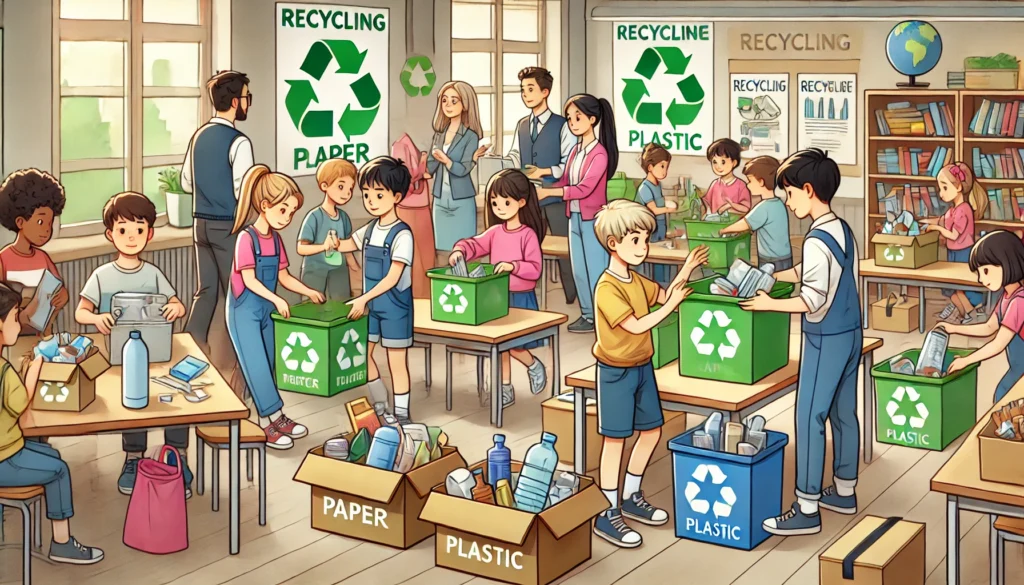In today’s rapidly changing world, where environmental concerns are increasingly urgent, incorporating environmental education in schools is vital. By including environmental education in their curriculum, schools can provide students with the essential knowledge and skills to safeguard our planet. This blog will explore why environmental education is important, how it benefits students, and what steps schools in India are taking to incorporate it.
Why Environmental Education Matters
Environmental education helps students understand the impact of human activities on the planet and encourages them to think critically about sustainability. By learning about topics such as pollution, climate change, and conservation, students become more aware of their environment and their role in preserving it. The role of environmental education in schools extends beyond mere knowledge; it fosters a sense of responsibility and empowers students to take action.
Benefits of Environmental Education
Promotes Critical Thinking
One of the primary benefits of environmental education is that it promotes critical thinking. Students learn to analyze environmental issues, consider different perspectives, and devise sustainable solutions. This skill is valuable not only for understanding environmental problems but also for other areas of life.
Encourages Sustainable Practices
When students understand the significance of conserving resources and minimizing waste, they are more inclined to embrace sustainable habits in their everyday lives. These can include simple actions like recycling, conserving water, and reducing energy consumption. When instilled at a young age, these habits can lead to a lifetime of environmentally conscious behavior.

Enhances Academic Performance
Studies have shown that environmental education can enhance academic performance. When students are engaged in hands-on, real-world learning experiences, they are more motivated and perform better in other subjects as well. Environmental education often involves interdisciplinary learning, combining science, math, and social studies, which can improve overall academic outcomes.
How Schools in India Are Embracing Environmental Education
Curriculum Integration
Many schools in India are now integrating environmental education into their curricula. This can be seen in subjects like science and geography, where students learn about ecosystems, biodiversity, and the effects of pollution. By making environmental education a part of the regular curriculum, schools ensure that all students receive this important knowledge.
Extracurricular Activities
Extracurricular activities are another way schools are promoting environmental education. Eco-clubs, nature walks, and tree-planting drives are common in many Indian schools. These activities provide students with practical experience and reinforce the lessons learned in the classroom.
Collaboration with NGOs
Schools often collaborate with non-governmental organizations (NGOs) to enhance their environmental education programs. Organizations like the Centre for Environment Education (CEE) and WWF-India (World Wide Fund for Nature) offer resources, workshops, and support to schools, helping them implement effective environmental education initiatives.
Real-Life Examples
The Green Schools Program
The Green Schools Program, initiated by the Centre for Science and Environment (CSE), is a notable example of environmental education in India. This program encourages schools to adopt sustainable practices and teaches students about the importance of conserving natural resources. Schools participating in this program undergo a comprehensive audit of their environmental practices and receive guidance on how to improve.
Earth Day Celebrations
Numerous schools in India mark Earth Day with a variety of activities designed to increase awareness about environmental issues. These celebrations often include events like clean-up drives, poster-making competitions, and educational talks. By participating in Earth Day activities, students learn about the global importance of environmental conservation.
How You Can Support Environmental Education
As parents and community members, you can support environmental education in schools by:
Advocating for Environmental Curriculum: Encourage schools to integrate environmental education into their curricula.
Participating in School Activities: Join in on school-organized environmental activities and show your support.
Promoting Sustainable Practices at Home: Reinforce what your children learn at school by practicing sustainability at home. Simple actions like recycling, conserving water, and reducing plastic use can make a big difference.
Conclusion
The role of environmental education in schools is vital for shaping the future of our planet. By teaching students about the importance of sustainability, we are preparing them to become responsible citizens who will take care of the environment. Let’s support and promote environmental education in our schools to ensure a healthier, greener future for all.
Author’s Note
Thank you for reading! Environmental education is a cause close to my heart. I believe that by teaching our young minds the value of sustainability, we can pave the way for a brighter future for our planet.
G.C., Ecosociosphere contributor.





Comments
I am curious to find out what blog platform you happen to be utilizing? I’m experiencing some minor security issues with my latest blog and I would like to find something more safeguarded. Do you have any suggestions?
Aw, this was a very nice post. Taking the time and actual effort to create a great article… but what can I say… I hesitate a whole lot and never seem to get nearly anything done.
Howdy just wanted to give you a quick heads up. The words in your article seem to be running off the screen in Ie. http://www.ifashionstyles.com
Hey there! Would you mind if I share your blog with my myspace group? There’s a lot of people that I think would really enjoy your content. Please let me know. Thanks http://www.ifashionstyles.com
Thank you, I have recently been looking for info about this topic for ages and yours is the greatest I have discovered so far. But, what about the conclusion? Are you sure about the source?
Heya this is kinda of off topic but I was wanting to know if blogs use WYSIWYG editors or if you have to manually code with HTML. I’m starting a blog soon but have no coding know-how so I wanted to get guidance from someone with experience. Any help would be enormously appreciated!
Hello! This is my first visit to your blog! We are a group of volunteers and starting a new project in a community in the same niche. Your blog provided us valuable information to work on. You have done a marvellous job!
That is the fitting blog for anybody who desires to search out out about this topic. You understand a lot its almost arduous to argue with you (not that I really would want匟aHa). You undoubtedly put a brand new spin on a topic thats been written about for years. Nice stuff, just great!
I’m curious to find out what blog system you have been using? I’m experiencing some small security issues with my latest blog and I’d like to find something more safe. Do you have any suggestions?
Have you ever considered about including a little bit more than just your articles? I mean, what you say is fundamental and all. However imagine if you added some great images or video clips to give your posts more, “pop”! Your content is excellent but with images and clips, http://www.kayswell.com this website could undeniably be one of the best in its field.
Hello colleagues, its enormous article regarding cultureand completely defined, keep it up all the time.
Thanks for the interesting things you have unveiled in your writing. One thing I’d prefer to touch upon is that FSBO associations are built as time passes. By presenting yourself to the owners the first weekend their FSBO is definitely announced, before the masses commence calling on Friday, you create a good interconnection. By sending them tools, educational elements, free records, and forms, you become the ally. If you take a personal desire for them as well as their situation, you make a solid relationship that, many times, pays off if the owners decide to go with a real estate agent they know and trust — preferably you actually.
I’m not that much of a internet reader to be honest but your blogs really nice, keep it up! I’ll go ahead and bookmark your website to come back in the future.
Thanks for this wonderful article. One more thing to mention is that most digital cameras are available equipped with a zoom lens that allows more or less of the scene to be included simply by ‘zooming’ in and out. These types of changes in focus length are generally reflected inside viewfinder and on large display screen on the back of the very camera.
Excellent blog! Do you have any helpful hints for aspiring writers? I’m hoping to start my own blog soon but I’m a little lost on everything. Would you recommend starting with a free platform like WordPress or go for a paid option? There are so many options out there that I’m totally confused .. Any suggestions? Many thanks!